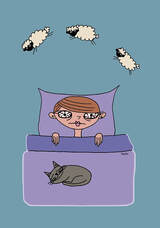
Insomnia is the deeply irritating difficulty in falling or staying asleep or disturbed sleep patterns that fail to refresh you.
Life events can result in short term insomnia whereas chronic insomnia is defined as occurring on more than three nights a week over three months.
Sleep deprivation can harm health. Effects on mental health include a decrease in thinking ability and memory, and an increase in low mood and anxiety. Poor sleep quality increases the likelihood of being overweight or obese. Sleep increases the production of leptin, an appetite suppressing hormone, so decreased levels of leptin with less sleep result in increased appetite. Reduced hours of sleep increase the risk of diabetes, hypertension and reduced immune function.
Treatment of insomnia with sedative drugs is no longer the first choice of treatment. These drugs have serious side effects such as daytime sleepiness and the risk of addiction.
A much more attractive option is to take herbal medicine as part of an integrated approach with lifestyle changes to improve sleep hygiene, diet, and exercise. These can be combined with other nonpharmacological methods such as talking therapies.
Herbal medicines are one of the most popular and frequently used therapies for treating insomnia. They can be readily bought over the counter and allow self-management of short-term periods of insomnia.
There are a wide range of sedative herbs which have a similar mechanism of action to sedative drugs, but they have far fewer side effects, and they are not addictive. Sedative herbs include:
There are several possible causes of insomnia, and these need to be identified if treatment is to be effective long-term. The aim of a Medical Herbalist is to identify the underlying cause and to select a combination of herbs which will provide both sedative actions to treat the symptom of insomnia and other herbal actions to treat the underlying cause. The possible causes of insomnia include:
So, diagnosis of the cause of insomnia determines the selection herbs for treatment. The selection of herbs can be modified for each individual and combined with advice on sleep hygiene, diet, and exercise to improve both the duration and quality of sleep.
Life events can result in short term insomnia whereas chronic insomnia is defined as occurring on more than three nights a week over three months.
Sleep deprivation can harm health. Effects on mental health include a decrease in thinking ability and memory, and an increase in low mood and anxiety. Poor sleep quality increases the likelihood of being overweight or obese. Sleep increases the production of leptin, an appetite suppressing hormone, so decreased levels of leptin with less sleep result in increased appetite. Reduced hours of sleep increase the risk of diabetes, hypertension and reduced immune function.
Treatment of insomnia with sedative drugs is no longer the first choice of treatment. These drugs have serious side effects such as daytime sleepiness and the risk of addiction.
A much more attractive option is to take herbal medicine as part of an integrated approach with lifestyle changes to improve sleep hygiene, diet, and exercise. These can be combined with other nonpharmacological methods such as talking therapies.
Herbal medicines are one of the most popular and frequently used therapies for treating insomnia. They can be readily bought over the counter and allow self-management of short-term periods of insomnia.
There are a wide range of sedative herbs which have a similar mechanism of action to sedative drugs, but they have far fewer side effects, and they are not addictive. Sedative herbs include:
- Valerian (Valeriana officinalis)
- Passionflower (Passiflora incarnata)
- California poppy (Eschscholzia californica)
- Hops (Humulus lupulus)
- Lemon balm (Melissa officinalis)
- Skullcap (Scutellaria lateriflora)
- Nutmeg (Myristica fragans)
- Chamomile (Matricaria recutita)
- Lavender (Lavendula angustifolia)
- Ashwagandha (Withania somnifera)
There are several possible causes of insomnia, and these need to be identified if treatment is to be effective long-term. The aim of a Medical Herbalist is to identify the underlying cause and to select a combination of herbs which will provide both sedative actions to treat the symptom of insomnia and other herbal actions to treat the underlying cause. The possible causes of insomnia include:
- Stress, anxiety or depression
- Gastrointestinal disorders
- Menopausal or other hormonal imbalances
- Musculoskeletal restlessness or pain
- Glucose imbalance
So, diagnosis of the cause of insomnia determines the selection herbs for treatment. The selection of herbs can be modified for each individual and combined with advice on sleep hygiene, diet, and exercise to improve both the duration and quality of sleep.
 RSS Feed
RSS Feed
